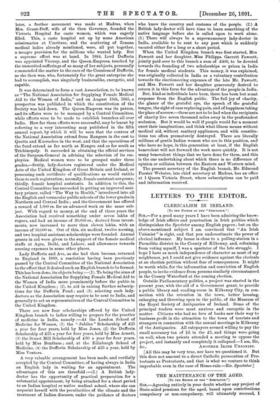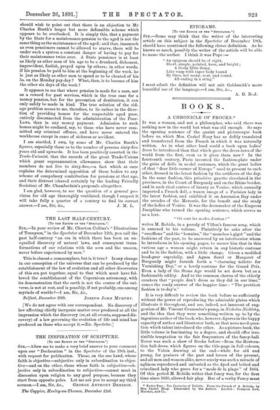THE MAINTENANCE OF THE AGED.
[To THE EDITOR OF THE "SPECTATOR."]
Sin,—Agreeing entirely in your doubt whether any project of State-aided pensions for the aged, based upon contributions compulsory or non-compulsory, will ultimately succeed, I should wish to point out that there is an objection to Mr. Charles Booth's larger but more defensible scheme which appears to be overlooked. It is simply this, that a payment by the State for a maintenance-pension to the aged is not the -same thing as the maintenance of the aged ; and that, inasmuch as even pensioners cannot be allowed to starve, there will be -under such a system a constant danger of having to pay for their maintenance twice over. A State pensioner is at least as likely as other men of his age to be a drunkard, dishonest, improvident, foolish, preyed upon by others ; in other words, if his pension be paid to him at the beginning of the week, he is just as likely as other men to spend or to be cheated of his .5s. on the Monday pay-day? What, then, is to become of him the other six days of the week?
It appears to me that where pension is made for a man, not as a reward for past services, which is the true case for a money pension, but for the prevention of destitution, it can -only safely be made in kind. The true solution of the old- -age problem seems to me, therefore, to lie rather in the direc- tion of providing homes for the respectable aged poor, entirely disconnected from the administration of the Poor- Laws, than in any money payment. Admission to such homes might be confined, say, to those who have never com- mitted any criminal offence, and have never entered the 'workhouse except in cases of sickness or accident.
I am startled, I own, by some of Mr. Charles Booth's figures, especially those as to the number of persons sixty-five sears old and upwards. It has been positively asserted in the Trade-Unionist, that the records of the great Trade-Unions which grant superannuation allowances show that their members do not live to sixty-five,—a fact which at once -explains the determined opposition of these bodies to any scheme of compulsory contribution for pensions at that age, and their distrust (shared certainly by the leading Friendly Societies) of Mr. Chamberlain's proposals altogether.
I am glad, however, to see the question of a general pro- vision for old age thoroughly ventilated, though I suspect it will take fully a quarter of a century to find its correct



































 Previous page
Previous page